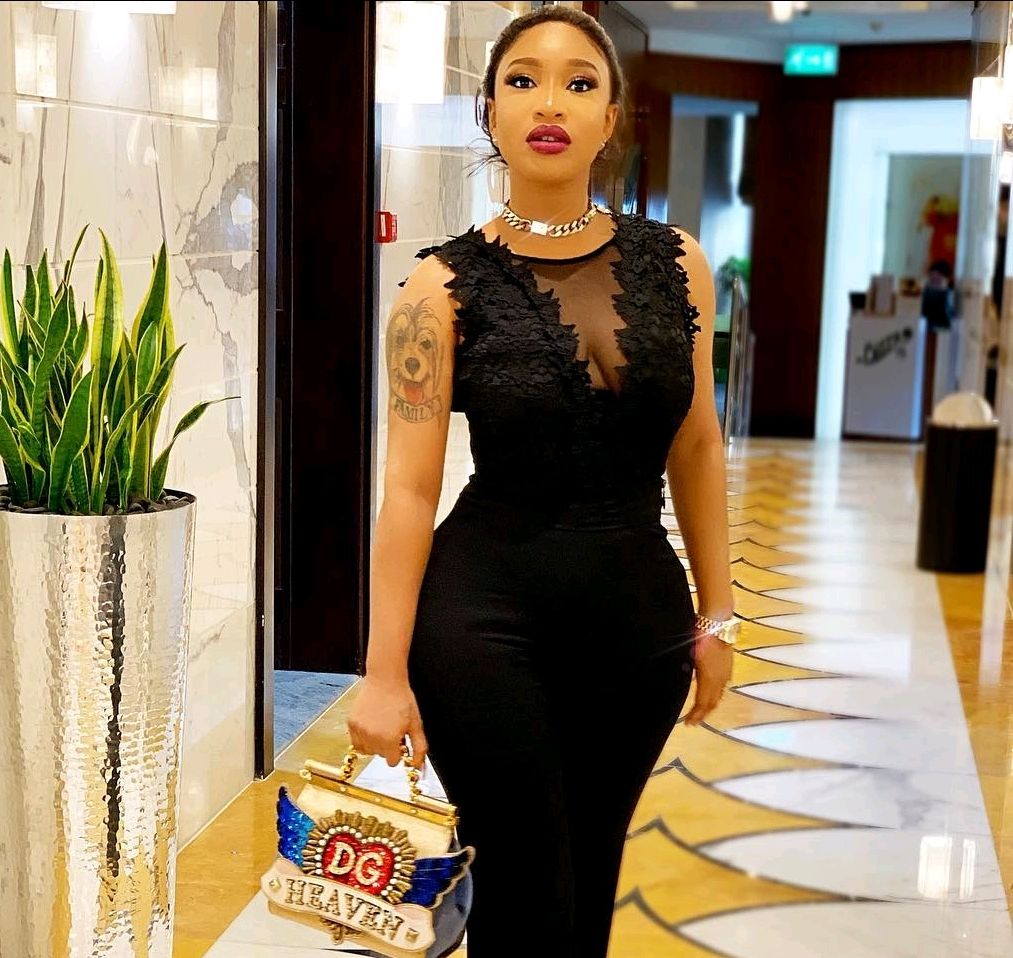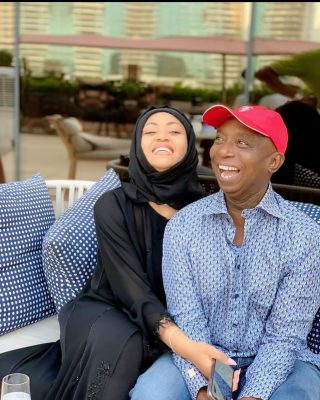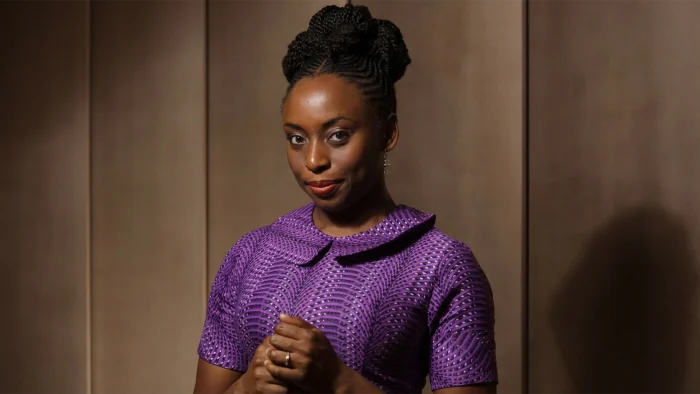
October 23, 2005 – Nigeria’s first lady, Stella Obasanjo, was declared dead from complications of a tummy tuck cosmetic surgery in Marbella, Spain, a few weeks before her 60th birthday. At the time, cosmetic surgery was still a foreign name concept in the country.
[ad]
Spoken about in bourgeois circles, 27-year-old Modupe Ozolua, founder of Body Enhancement, a cosmetic surgery company, only two years earlier, promised that her services, Botox, tummy tuck, breast augmentation, laser liposuction among others, held the secret to the wells of ageless beauty.
It was perhaps the first time someone in Nigeria would publicly talk about cosmetic surgery services. Until then and for a long time to come, Nigerians believed that water, exercising and eating healthy were the only methods to achieve the same youthful appearance of the rich and powerful that adorned their screens and magazines.
The cause of the first lady’s death was hence a startling revelation.

Enters 2018
Nigerian actress Tonto Dike who has just gone under the knife, takes to Instagram to announce that she is “ready to conquer the world” after her cosmetic surgery. “For the first time I took my time to appreciate my new body (Damn too sexy by the way), I cried, I leaped with joy and all I can say is am so ready to conquer the world with my newfound confidence….” she wrote in part.
[ad]
Although it would set tongues wagging, the revelation of her new body attracted not a few words full of admiration. Tonto Dike had been “Kardashianized”- a term used to describe the beauty and body standard introduced by the Kardashian family – the tiny waist, shaped bottom, elevated facial features and overall curvy figure.

A far throw from the 90s slim frame body standard, a plastic and reconstructive surgeon, Dr Daniel Barrett, opines that the world has the Kardashian clan to thank for their openness about their surgery encouraging women who aspire to have their body talk freely. “It’s just been completely revolutionary, in terms of the openness of people talking about the work that they’ve had done. It’s almost like, ‘Yes, I got a Gucci bag, but I also got my breast augmentation or my BBL.’ People are actually proud, and they talk about it, and before that never happened.”
[ad]
The science of Beauty
“Standards of beauty describe in precise terms the relationship that an individual will have to her own body. They prescribe her mobility, spontaneity, posture, gait, the uses to which she can use her body. They define precisely the dimension of her physical freedom and psychological development, intellectual possibility, and creative potential is an umbilical one,” – Andrea Dworkin.

What is beauty? Who defines beauty and what parameters are used to describe what is beautiful?
From the times of Ancient Greece (c. 500-300 B.C.) which saw women consuming food with the hope of putting on weight because it meant that her family was wealthy to the Italian Renaissance (c. 1400-1700) when the criteria for defining beauty was fair skin, big breasts, light hair and full hips to the appreciation of melanin and curvy bodies, beauty standards over time have shown that it is not constant.
However, the first attempt to manipulate the body to appear a certain way was in the Victorian age period when corsets became popular as it was made to raise the breasts higher and give the hourglass shape.
[ad]
Although corsets have been found to not be a permanent solution, the ideology and standard are still the same.
But Dr Anthony Youn, a top American plastic surgeon, in an interview with The Daily Beast quips that this belief in the latest standard is in itself problematic.
“There’s so many aspects of beauty, there’s so many ways to be beautiful, and there isn’t one template for beauty. There are some ethnicities where that type of template, that type of appearance is just not possible. I think what is disturbing about it is, if people think that this is the only standard.”

Dr Kosy, an assistant Cosmetic surgeon, opines that having the perfect body is an empowerment strategy.
“People want their bodies back. A lot of people have gone through pregnancies, and you can’t overemphasise what pregnancies have done to their bodies. Some of them are even encouraged by their partners.
“They want to get their self-confidence back and they want to like what they see when they pass by a mirror. A lot of times, it is not about the butts or hips, it is that they want to feel how they felt before pregnancy or changes. It is a confidence booster… the amount of light that has come into people’s lives to boost their esteem and how they see themselves is a good thing.”
[ad]
Speaking further, Kosy opines that another reason why people opt for this option is that they have insecurities which they believe can be solved with cosmetic surgery. A proven fix-it-all, if done wrong, could have lifelong damaging consequences.
Nigerian-British Abimbola Ajoke Bamgbose died in August, 2020, after multiple organ failure due to complications of liposuction surgery in Turkey. Until she called to complain, her husband, Moyosore Olowo, believed she was on a holiday with her friends. During an interview, he hinted that she thought that her tummy was big, a problem he didn’t see, “When a woman is unhappy and getting feelings about her looks, the clothes she buys do not fit and people ask if she is pregnant because of her tummy, sometimes there is nothing we can do. We are powerless.
“I wasn’t concerned. I told her ‘you have three children’. I told her my tummy is bigger than hers.”

Abimbola is not an isolated case. While countries like Turkey, Dominican Republic and Mexico are notorious for botched cases, they offer cheaper alternatives to getting the Kardashian body.
Yet, there is an increasing number of people turning to these countries or their native country for a solution, and Nigeria is not left out. Unlike the days of Modupe Ozolua, several cosmetic surgery offices have sprung in different parts of the country, with a major concentration in Lagos. Like other countries around the world, the Brazilian Butt Lift is the most popular. Because it is a procedure intended to create the bottoms of a woman of South American heritage, it involves the transfer of fat from one part of the body to the bottoms to give it a lift and fullness. A dangerous procedure, celebrities and social media influencers seeking to have the perfect bottoms have popularised this procedure.
[ad]
In Nigeria, costing an average of $5000, Brazilian Butt Lift is the most requested surgical procedure in Lagos. As exciting as the outcome is, the American Society of Plastic Surgeons notes the Brazilian butt lift (BBL) death rate is the highest of all procedures, with fat embolism being the leading cause of death. In addition, a 2017 research survey of 692 surgeons published in Aesthetic Surgery Journal reported a huge 32 deaths from fat embolism and 103 non-fatal cases (1 in 3,448 fatality rate). In 2020, it reported a mortality rate of 1 in 14,952. In comparison, breast enhancement surgery has no reported deaths.
Since 2018, the name Dr Anu Fella, founder of Lagos-based plastic surgery company, Med Contour, has rung a bell for the wrong reasons. From the death of a certain Nne from a surgery gone wrong to the type of service rendered to Omohtee, a Nigerian social media influencer has not deterred Nigerians.
Despite the dangers, some have resorted to even cheaper ways to get the beauty procedure. In countries like Venezuela, and Congo, where bigger bottoms mean a better appeal to the opposite sex, women are taking extreme measures, including using banned buttock silicone injections. Going for less than $8, this injection can lead to life-threatening cases, including death.
Around the world, Dr Kosy believes that lack of research has been the bane of the journey into the world of cosmetic surgery.
“You have to research about where you want to do the surgery; the doctors who will be doing the surgery and most importantly, everything you can about the procedure you want to do, what areas you want to get the surgery, what the overall recovery process is like, the pain level, the downtime, everything it entails. Social media has painted the ‘i just want to get my body done’ but they have forgotten that it is a surgical procedure.”
The idea of what defines beauty, like perfection, is always a moving target. It is also relative. What happens when beauty standards change and this is no longer feasible? Will there be a time such as this? Time will tell.
Everyone should, for themselves, define what beauty means to them and not be swayed by society or the media.
[ad unit=2]








